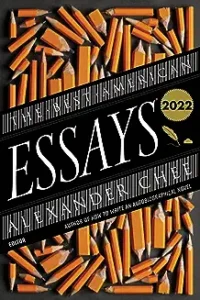The Best American Essays 2022 editor Alexander Chee
The Best American Essay series, edited by Robert Antwan, has been published annually since 1986 when Elizabeth Hardwick, one of the founders of the New York Review of Books, was the guest editor. I became acquainted and enthralled with this series twenty years ago and have bought and read each year’s edition since then. I also managed to collect all the volumes back to 1986, and I’ve read them in reverse order through 1996 when I seem to have run out of gas. Someday, I’ll get to the first 10.
These are terrific volumes demonstrating the variety, power, and versatility of the personal essay and featuring both the established writers of our time as well as those new to the scene. Antwan should be much honored both for his erudite and interesting forewords to each volume and for his creativity and openness in choosing outstanding guest editors. Those guest editors in the past have included Annie Fadiman, Adam Gopnik, Hilton Als, Edwidge Danticat, Kathryn Schulz, and Tracy Kidder among others, and in each case, the guest editor has chosen contributors and essays which in some way reflected their world view and specific life story. The guest editors’ Introductions are also some of the best essays I’ve ever read and should be carefully read.
This year’s volume may be the most extreme example of the guest editor’s personal life story affecting their choice of essays to include. Alexander Chee, a gay, Korean-American essayist and novelist, chose a most unusual set of 23 essays. Rather than aim for variety and balance as most editors have done and rather than rely on time-tested, well-published writers, every essay in this volume addresses the challenges and perils faced by those ‘othered’ in our society. With a single exception, these authors were unknown to me and I venture to guess, unknown to most readers. In one case, this essay is the first work published by one of the contributors. The authors were predominantly female or non-binary people of color and hyphenated Americans (e.g. Chinese, Jamaican, Philipino, Korean, Mexican-Americans), and only two white males (one of whom is an immigrant) were included. The topics of the essays were, similarly, starkly different from preceding years when book reviews, politics, or various art disciplines were the focus. There are two essays about transitioning, three essays about alcoholism, several about depresssion or bipolar disorder, and the remainder about poverty and its damaging impact. Family and partners are often front and center in these works.
I found the volume to be unsettling, and I think that was the editor’s intent. I usually look forward to reading established authors’ writing about establishment topics, enjoying their prose and their views on topics more or less famliar to me. Not so this year, and kudos to Antwan for supporting this non-establishment approach and to Chee for gathering these powerful pieces.
Read this volume for a greater appreciation of the complexity, difficulty, and hostility faced by those who are ‘othered’ in today’s America. Not an easy read, but an important one.
And, just as the content of these annual collections have changed with the times, the covers of these volumes have also undergone changes over the years responding, no doubt, to the publicists at Mariner Books who have been demanding more color, more design, more pizzazz for marketing. This year’s cover is the first one to feature images, and I love that they are pencils, short ones, fat ones, skinny ones, roughly sharpened ones, flat ones, round ones, hexagonal ones—-all in that wonderful ‘pencil yellow’ hue and all without anything printed on them. The perfect accompaniment to my pencil collection which now numbers 223 pencils!



